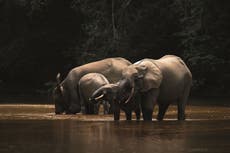Boris Johnson pledges to protect 30% of UK land as world leaders sign commitment to act on climate crisis
Other world leaders including Emmanuel Macron, Angela Merkel, Justin Trudeau and Jacinda Ardern to sign UN pledge

Your support helps us to tell the story
From reproductive rights to climate change to Big Tech, The Independent is on the ground when the story is developing. Whether it's investigating the financials of Elon Musk's pro-Trump PAC or producing our latest documentary, 'The A Word', which shines a light on the American women fighting for reproductive rights, we know how important it is to parse out the facts from the messaging.
At such a critical moment in US history, we need reporters on the ground. Your donation allows us to keep sending journalists to speak to both sides of the story.
The Independent is trusted by Americans across the entire political spectrum. And unlike many other quality news outlets, we choose not to lock Americans out of our reporting and analysis with paywalls. We believe quality journalism should be available to everyone, paid for by those who can afford it.
Your support makes all the difference.Boris Johnson will pledge to protect 30 per cent of the UK’s land by 2030, which will see an additional 400,000 hectares of land in England protected to support the recovery of nature.
The prime minister will make the pledge during a virtual United Nations event on Monday, where he is set to warn that countries must act to reverse the loss of biodiversity.
He will sign the Leaders’ Pledge for Nature at the event, alongside other world leaders including Emmanuel Macron, Angela Merkel, Justin Trudeau and Jacinda Ardern, who are among 64 leaders from five continents warning that humanity is in a state of emergency due to the climate crisis.
The 10-point pledge aims to counteract the damage done to systems that underpin human health and wellbeing.
Currently, 26 per cent of land in England comprises of national parks, areas of outstanding beauty and other protected areas. Mr Johnson’s commitment will see an additional four per cent being protected, equivalent to the size of the Lake District and South Downs national parks combined.
Commitments outlined in the pledge include a renewed effort to reduce deforestation, stop unsustainable fishing practices, eliminate environmentally harmful subsidies and begin he transition to sustainable food production systems and circular economy over the next 10 years.
The pledge has been described as a “turning point” by which future generations will judge world leaders’ willingness to take action on the climate crisis.
Mr Johnson will say during the virtual event: “We must turn these words into action and use them to build momentum, to agree ambitious goals and binding targets.
“We must act now, right now. We cannot afford to dither and delay because biodiversity loss is happening today and it is happening at a frightening rate.
“Left unchecked, the consequences will be catastrophic for us all. Extinction is forever - so our action must be immediate.”
Environmental groups welcomed the commitment, but called on the UK government to invest in existing protected sites and put the new pledge into law.
Dr Richard Benwell, chief executive of The Wildlife and Countryside Link, said: “Just eight per cent of England is currently protected for wildlife, so designating 30 per cent of land to restore nature would be a tremendous step forward…
“Of course, designation alone isn’t a guarantee of change. As with marine protection and existing terrestrial protected sites, strong management and investment are also needed.”
WWF-UK chief executive Tanya Steele said the announcement must be “backed up by urgent ambition”, calling for “strong legislation to avoid damaging trade deals and to stop the food we eat from destroying the environment”.
“Only then can we meet our climate targets, put nature on the path to recovery and set our sights on global leadership at Cop26,” she added.
Earlier this month, the UN announced that the world had failed to meet a single target to stop the destruction of nature. The WWF and the Zoological Society of London also released damning reports and studies in recent weeks, revealing the global populations of mammals, birds, fish, amphibians and reptiles plunged by 68 per cent on average between 1970 and 2016.






Join our commenting forum
Join thought-provoking conversations, follow other Independent readers and see their replies
Comments